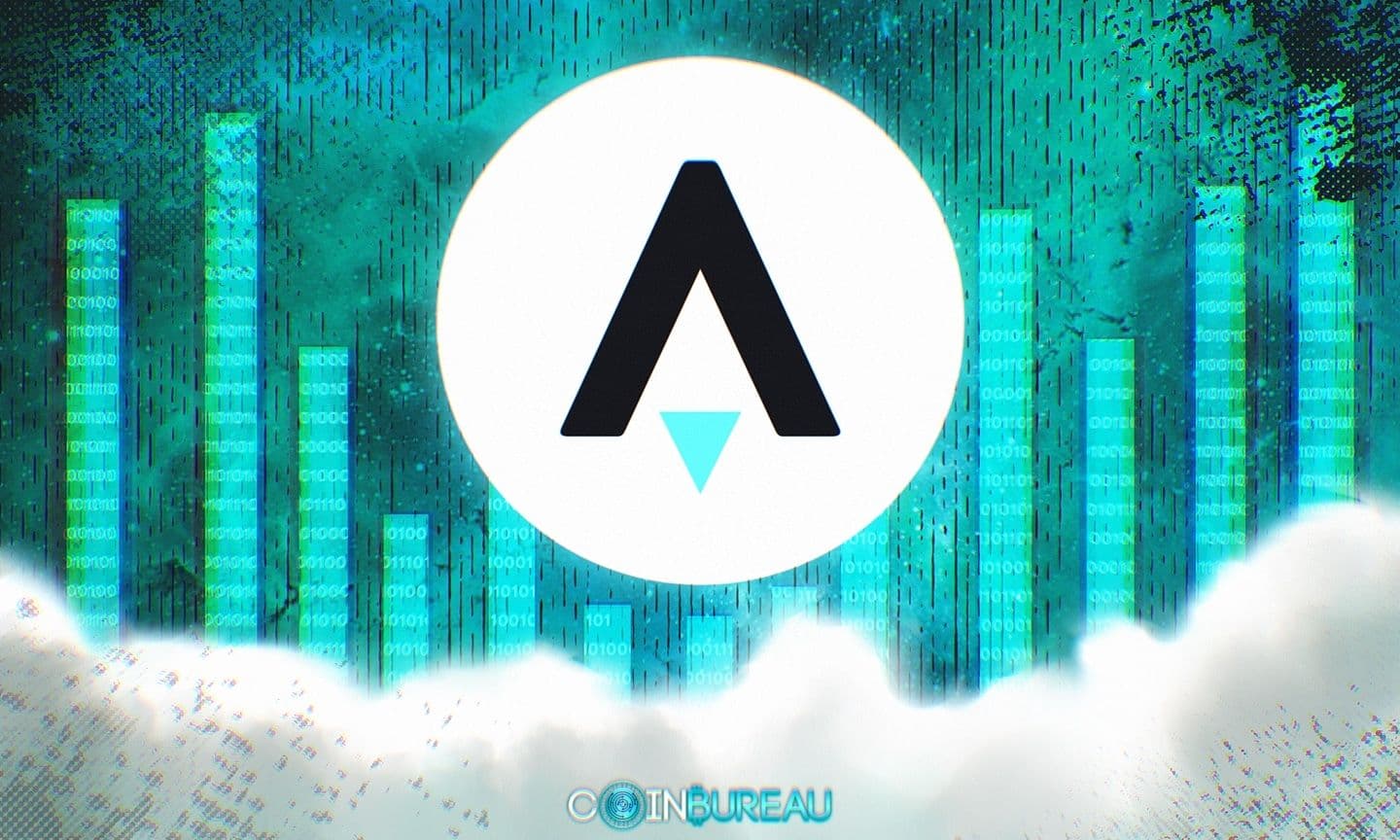When I first heard of the Metaverse, it was Decentraland, and it introduced me to the idea of buying virtual land parcels (because that's what people do in real life). The idea is to buy a piece of land and then develop it. After all, what can you do with a piece of land except build stuff on it? However, this means that the entire Decentraland metaverse is literally built from the ground up by the various users.
Other than Genesis Plaza, there isn't any kind of city/world planning. Initially, what makes the news is how much a piece of land changed hands on Opensea. Gradually, as more and more users got on board, it started to be a place where users can have a kind of metaverse experience without owning property.
What if the original focus isn't on land-owning but the user's experience instead? Someone else had a similar idea, and this is how Portals, a web-based metaverse platform, was conceived.
What is Solana Portals
When someone first steps foot in a new city, like Tokyo or New York, one can't help but feel a tremendous amount of excitement at what awaits and maybe a tad bit (or more!) of feeling overwhelmed because there is so much to explore (and likely so little time). That's the kind of first impression the Portals team is aiming for with the Downtown district, the heartbeat of the Portals universe.
This is where users get to dip their toes by exploring Building One units built by the team. Here, one can play games, collect items or even get involved with some quests! Currently only available as a browser page for Chrome-based browsers and Microsoft Edge, Portals is all about giving users the best Metaverse experience possible. Indoor experiences include apartment decorating, and playing games, while outdoor adventures include attending concerts, watching movies etc.
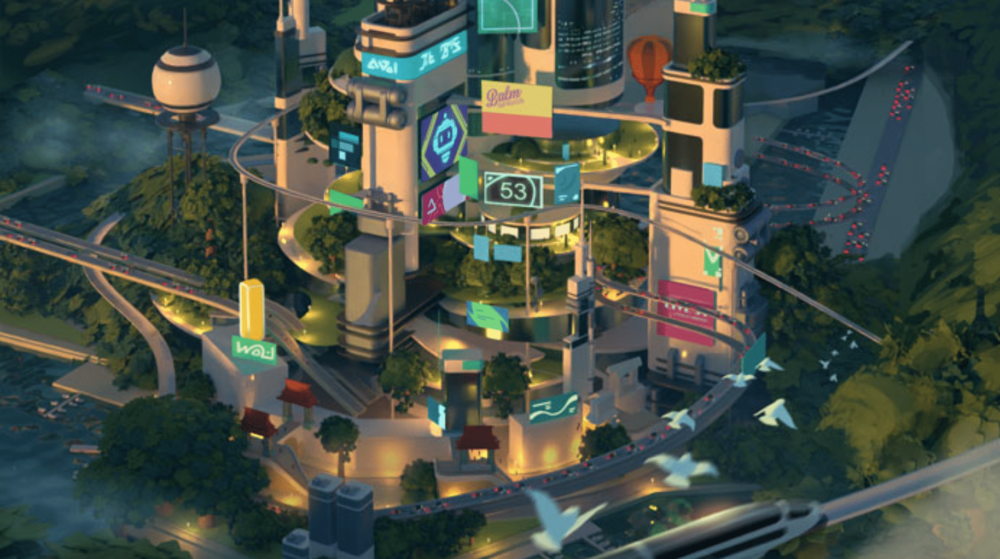 What the Downtown area of Portals looks like from the outside Image via Portals
What the Downtown area of Portals looks like from the outside Image via PortalsAside from wandering around in the Downtown area, you can buy a plot of land (and build on it), have your own pad, known as Pods (without having to own the land), and have a certain level of freedom decorating it (though not as much as creating your own from scratch). Basically, it's the difference between building your own house and renting an apartment.
Portals is designed to be like "Animal Crossing meets Roblox and Sim City", says Adam Gomez, one of the co-founders. I've not played any of those games before (or most games, for that matter!) but I've heard enough to whet my own curiosity so I'm keen to continue exploring. If this sounds like your cup of tea/coffee/energy drink, read on!
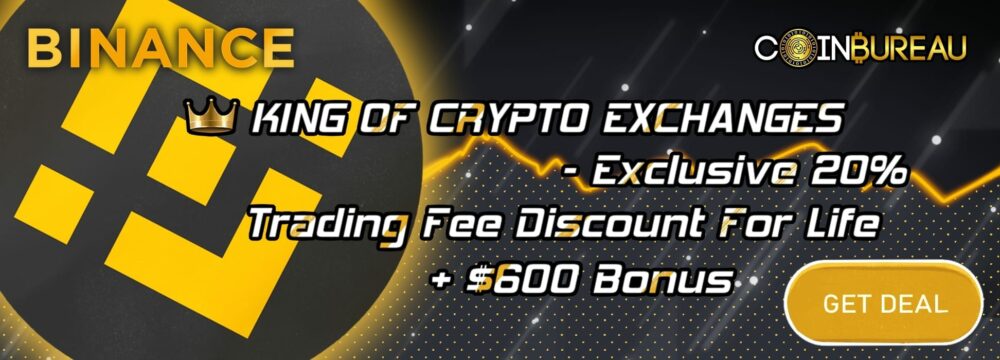
Solana Portals Access Cards
Unlike Decentraland, where you can stroll around Genesis Plaza just by connecting your Web3 wallet and immediately be in the thick of things, with Portals, you need to gain some kind of access to that world in addition to a Solana Web3 wallet (I picked Phantom). There are two ways to do so, each with its own set of experiences.
Portals Real Estate
The first type of NFTs sold on Portals are access cards. There're three types in order of size of space, with the largest listed first and the corresponding supply: Vision (75), Onyx (425), and Ivory (4500). The benefits of having these cards include:
- Gives the cardholder access to the Downtown district
- Build your own space or rent it out to others
- Invite friends to come and hang out with you or host a block party
- Add HTML5 games
- Set admin privileges to other wallets (ooh... I wonder how that works!)
- Discoverable in Downtown and Directory - I'm thinking storefront or shop that allows others to wander in. What kind of shop would you like to set up?
 Clockwise from left: Vision, Onyx, Ivory - artistic renderings Image via Portals Discord
Clockwise from left: Vision, Onyx, Ivory - artistic renderings Image via Portals DiscordThe floor price for one of these cards currently stands at 50 SOL (approx. $5000) according to Magic Eden, Solana's NFT marketplace. When the cards were first minted, they cost 1.5 SOL in November 2021. The price of the SOL token then was definitely on the high end, around $200 - $260. Still, given that the NFT has gone up about 50x, there's a tidy profit to be gained by it.
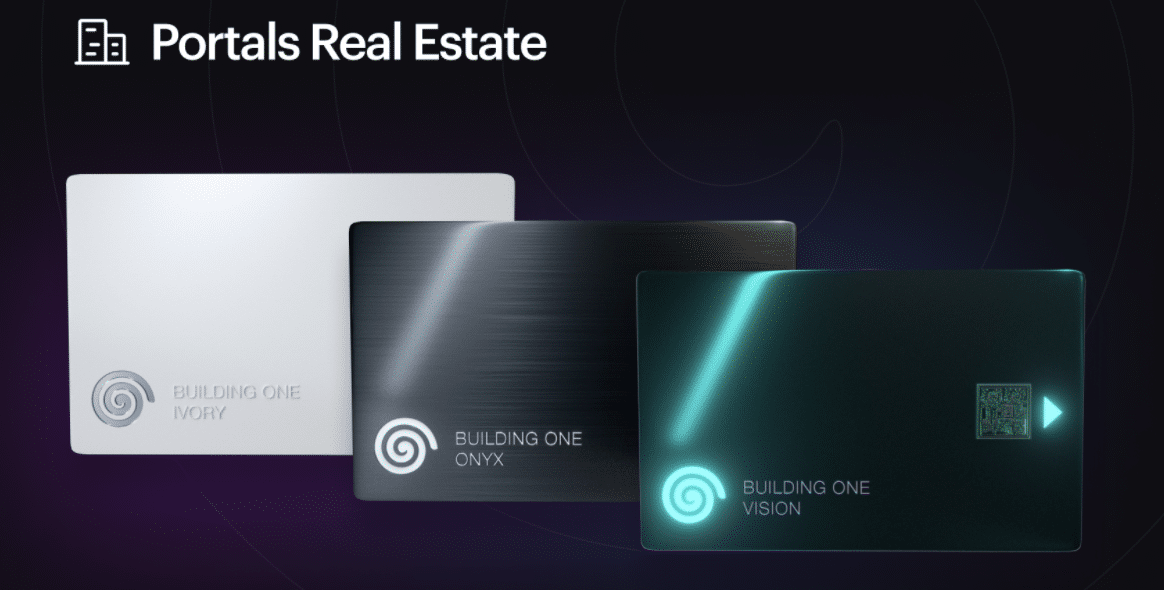 3 sizes of land plots to choose from Image via Portals Discord
3 sizes of land plots to choose from Image via Portals DiscordCitizen Cards and Pods
For those who are unable to afford the plots of land the cards above represents, don't worry. You can still have your own pad courtesy of Citizen Cards. These cards also give you access to the Downtown district, plus you get your own Pod that you can decorate with your own items.
Just like the land plots, you can also invite your friends to hang out at your pad as it comes with voice and text chat. Best of all, your friends don't need to own any NFTs as long as you have yours. Being a Citizen also puts you in the priority queue for some events or even Citizens-only events, just like a membership.
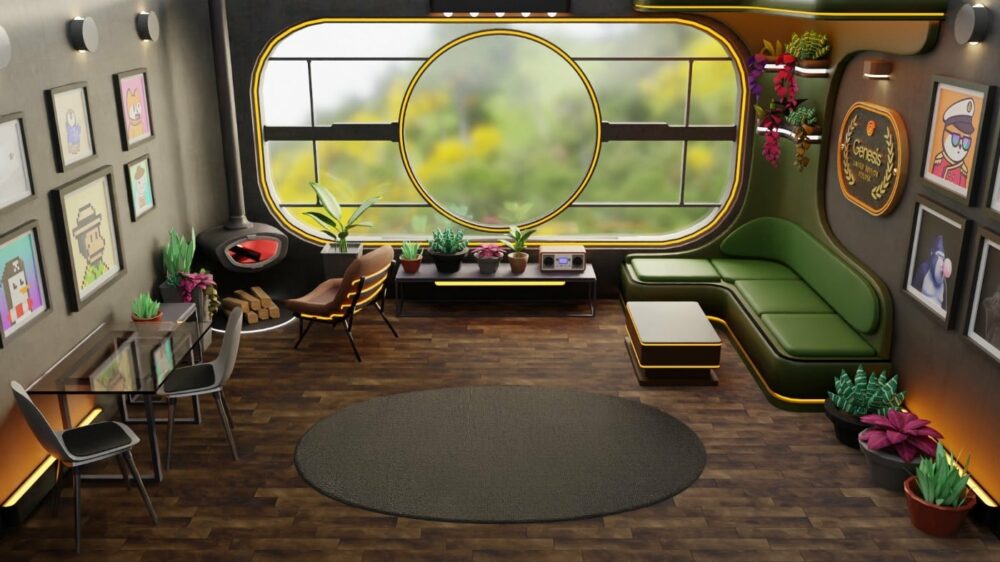 Love the window wall in Genesis Citizen Cardholder's pod space Image via Portals
Love the window wall in Genesis Citizen Cardholder's pod space Image via PortalsThree types of Citizen cards are available, two of which are open to the public:
Genesis - limited to 10,000 cards only. The floor price for one is 3.69 SOL which you can get at Magic Eden.
Standard - 35,000 in circulation for now, with the possibility of more to come in the future, based on demand. These are going for a minimum of 0.30 SOL at the time of writing.
Partner - for those in partnership with the Portals project team. Works with a Partner branding program.
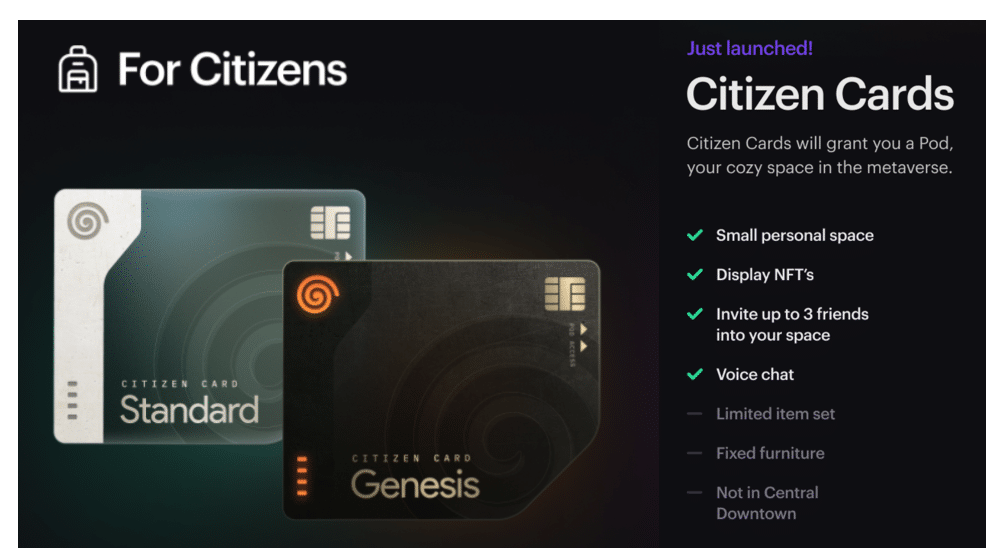 What you can get as a Citizen in Portals Image via Portals Discord
What you can get as a Citizen in Portals Image via Portals DiscordBronze Key Hunt
Initially doubling as a demo, the Bronze Key Hunt gives an idea of the possible experiences in Portals. The user can interact with some items within this room, including playing a Pac-man Game and getting clues to solve the mystery of finding the Bronze Key.
Since it's a demo room, I can't move furniture around willy-nilly, which I assume I'd be able to do when I have my own Pod. The demo is a bit basic (or I'm just terrible at these kinds of escape-room type of games), enough for potential users to catch a glimpse of its potential.
 Play a mini-game within while hunting for the Bronze Key Image via Portals
Play a mini-game within while hunting for the Bronze Key Image via PortalsThere's also a FAQ section to help users customise their own rooms. Users are encouraged to head over to the Discord channel to get help if they're stuck in the key hunt.
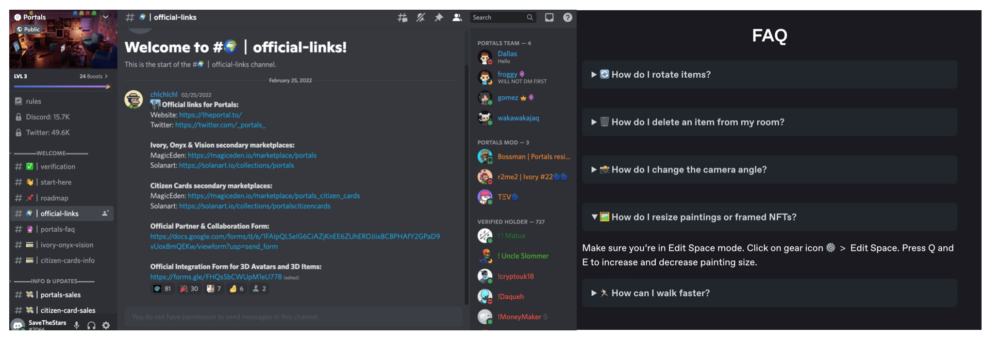 Get help from the friendly team at Discord and instructions on how to interact with the objects
Get help from the friendly team at Discord and instructions on how to interact with the objectsPortal Spaces by the Community
Those holding the land slots in Portals have actively started building their own spaces. A handy click-and-drag room editor allows you to move the furniture around, bring in your own NFT items or pick from a list of default ones to populate your room.
Special thanks to @premes, @Zeb and @IpseitR for allowing me to showcase their Portal spaces.
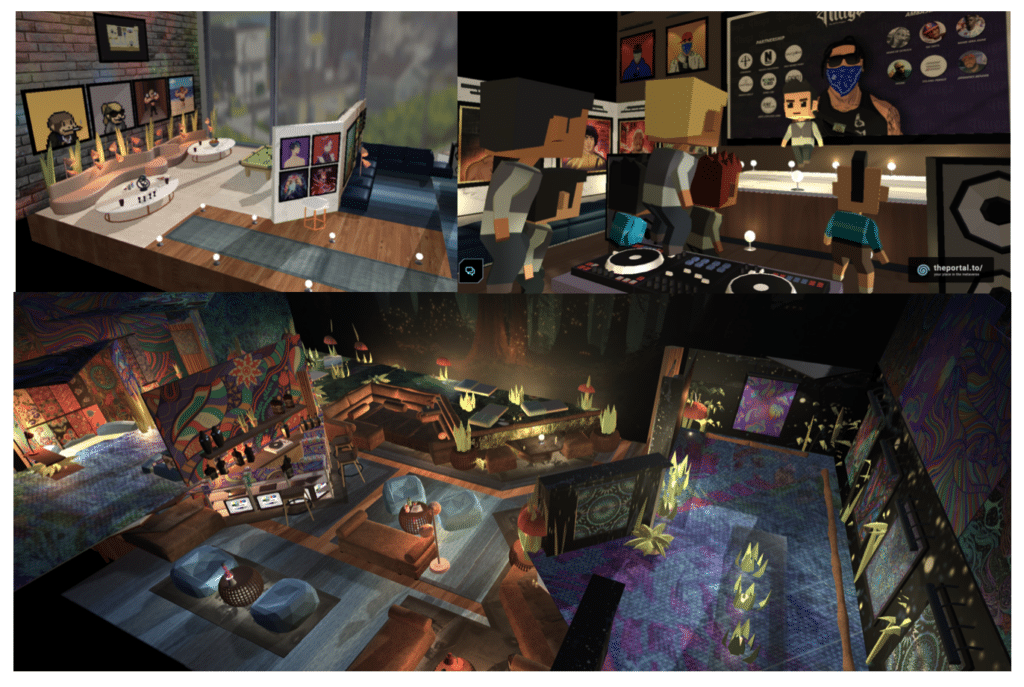 Spaces created by community for hanging out Image via Portals Discord with permission by owners
Spaces created by community for hanging out Image via Portals Discord with permission by ownersSolana Portals Origin
Oddly enough, when the concept of Portals first emerged in 2020, doing it in crypto was not the first choice for co-founder Adam Gomez.
He revealed this in a YouTube AMA that the original impetus for building Portals was that he wanted to do something along the lines of Snow Crash (the oft-quoted novel by Neal Stephenson that coined the term "metaverse"). However, VR technology isn't ready for the masses yet, so he was casting around to see what can be done given the current technology available. Then he saw Animal Crossing and Gather, an online working space, and felt that maybe something like that would be cool.
He even thought of approaching Facebook or Mozilla to see if it's possible to get something like this off the ground with them but decided it would not work out. It was around then that the thought of building it on a crypto blockchain got some serious consideration. The actual project-building took place in early 2021, bootstrap-style. Then they found out about the Solana Ignition Hackathon, decided to go for it, and placed 2nd in the Gaming section. That's how they got the mojo and support to really push the project forward.
The Portals Team
Adam Gomez (Founder) has a background in building gaming apps for the past 15 years. His experiences in web and video-game with a marketing focus provided a solid foundation for bringing Portals to life. While working for an agency, some of his clients include Disney, Blizzard, Riot Games, and Microsoft.
Known as Wakawakajaq on the Portals Discord, this is the other founder for Portals. Complementary to Adam's skills, Wakawakajaq brings 10+ years of experience in operations and product in AR/VR experiences at a software studio, whose clients also include Disney, Blizzard, Riot Games and Microsoft. (If I had to take a guess, I'd say both of them met while doing these projects together).
The third key member in the team is Chris, known as chlchlchl on the Portals Discord. As the Comms, Partnerships & Community manager, Chris has 15+ years of experience with community building & partnerships under the belt. In addition, Chris is also the founder of an NGO with a mission of teaching the next generation about technology, software, hardware, and robots in more than 80 cities.
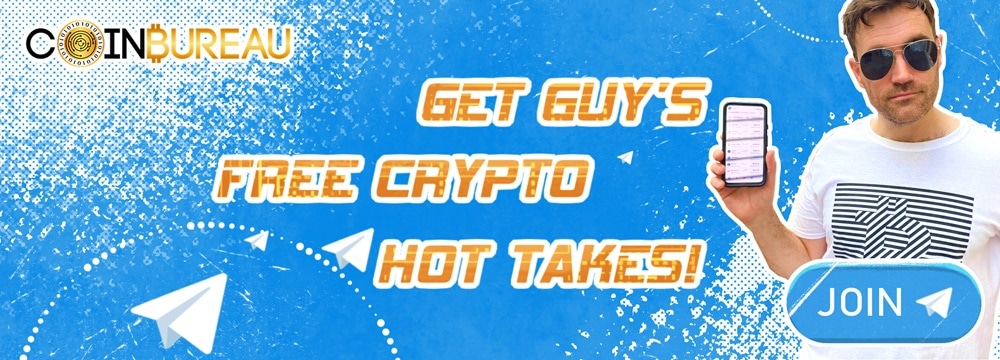
Solana Portals Investors
The strength of most blockchain projects can also be seen in the calibre of investors it attracts. For Portals, they've gotten the attention of some pretty decent names such as Alameda Research and Solana Ventures, which is basically buy-in from the Solana network itself. As the first virtual world project to launch on the Solana blockchain, the success of Portals would do well to reflect the success of Solana.
Recently, they also managed to obtain $5 million in seed capital to fund the project's development. Other investors include Justin Kan, co-founder of Twitch, a streaming video site favored by gamers. With the funds in place, they're going on a mini hiring spree, looking for software engineers, marketing managers, content writers etc. At least it seems like they are ready to put their backs into building this project, which is a good sign.
Solana Portals Partnerships
As mentioned earlier, one of the access card types offered is Partnership cards. This type of card indicates their strong commitment to forging partnerships with strong brands that can help grow awareness and give it the cache it needs to stand out from a very crowded marketplace. Some of these brands include Binance.US, FTX.US and Audius, to name a few. They've already set up shop in Downtown, waiting for you to check them out! Doubtless, as the project progresses, they will be able to attract more names to the space and build a well-rounded ecosystem within the Portals metaverse.
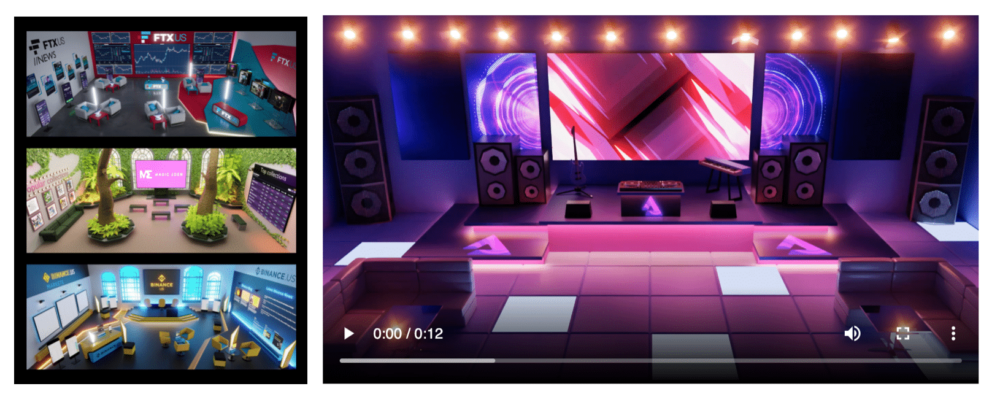 Chill out to some cool tunes at the Audius lounge or check out your crypto prices at Binance or FTX
Chill out to some cool tunes at the Audius lounge or check out your crypto prices at Binance or FTXSolana Portals Roadmap
The latest roadmap for Portals was unveiled on April 27th, and with it, a treasure trove of new things to look forward to in the near future. Here are some of the key updates:
- More spaces were added to the Downtown area, including a Gallery and an Arcade. The former is where the team plans to work with Portals NFT holders to curate experiences and events for everyone. The latter is best described below:
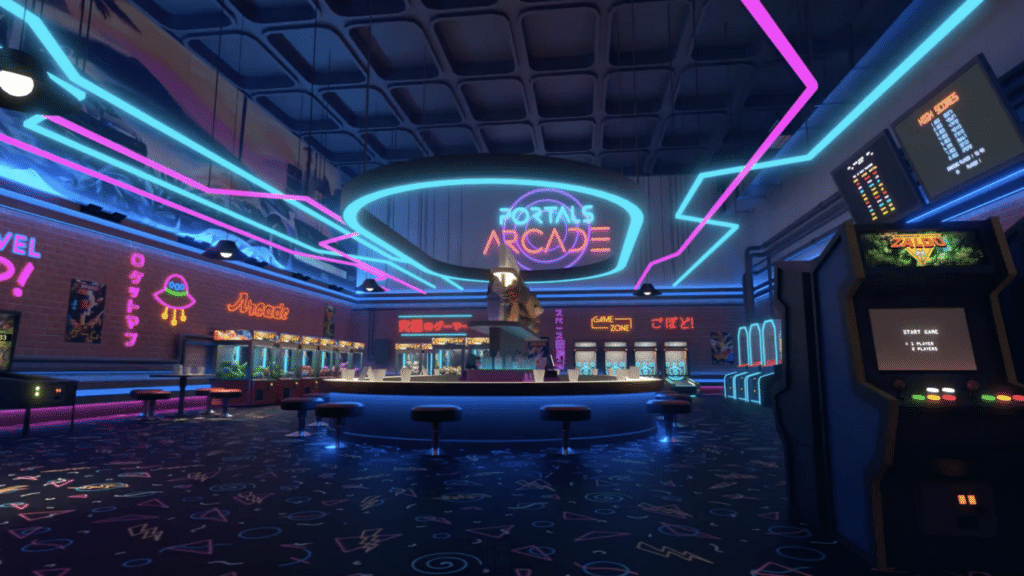 Let the arcade-fiend within you dazzle at the Portals Arcade Image via Portals Medium site
Let the arcade-fiend within you dazzle at the Portals Arcade Image via Portals Medium site- Hang out with your pets in your Pod, at least the NFT version, and maybe just like that once-upon-a-time Tamagotchi game (if you're old enough to remember it!), check back to see how your pet is doing.
- Partnership with OpenSea - that's right! It's coming to Portals, too, bringing ETH NFTS into the Solana world. They will have a "storefront" in the District, a new concept introduced in the roadmap this round with "Preview District Zero", featuring spaces from Solana, FTX.US, MagicEden, Binance.US, and Audius too.
- For Vision/Onyx/Ivory "landowners", the Portals team is hard at work making this the premiere space to set up shop, not just for malls and shopping but also other kinds of spaces that make for an interesting experience just like in a metropolitan city. In real life, size matters and the Vision buildings will have the largest street presence, being the biggest ones.
Demo Space
The latest demo space unveiled is way more impressive than the setup in the Bronze Key Hunt. Instead of just a standard blocky avatar, they've integrated with ReadyPlayerMe to allow avatar customisation. It's time to bring out that Adidas NFT you've been itching to show off and traipsed around Downtown with them!
By uploading a picture of myself, I was transformed into a very cool-looking avatar dressed in outfits supplied by Pull&Bear, a fashion brand I've seen in malls here and there. You can connect your Solana and/or Ethereum wallet to display your NFTs on the walls in designated spots. A range of motions are available, including sitting down and waving, but for the life of me, I couldn't figure out how to get my avatar to do those actions.
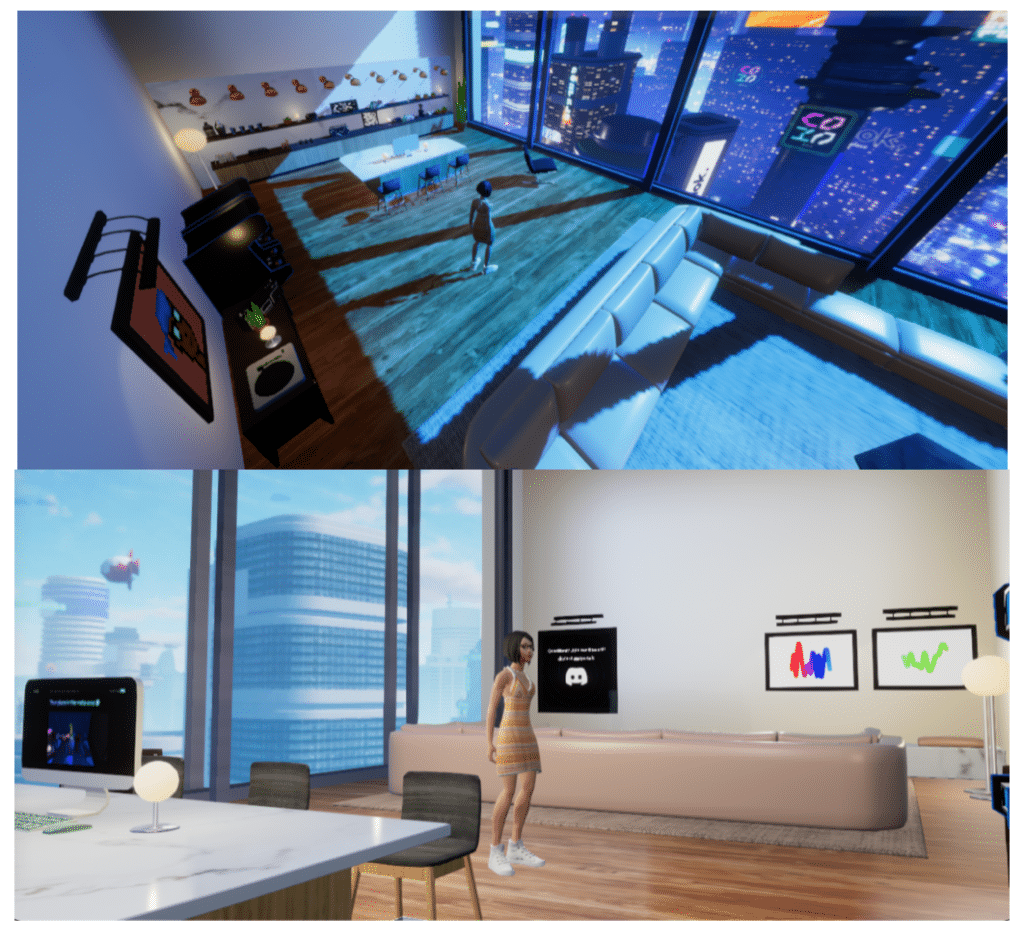 Toggle between Day and Night with the new demo at Portals Image via Portals
Toggle between Day and Night with the new demo at Portals Image via PortalsLike the Bronze Key Hunt, you can also play arcade games in the space and chill out with a pretty snazzy view of Downtown. If you are interested, you can check out the demo version here.
Conclusion
I found something enjoyable about this project when I was doing research about it. The concept is easy to understand. Either I'm a landowner/shopkeeper with a Portals NFT or just your ordinary citizen hanging out in a city that puts me as a user first. The thing I like most is that I don't need to own land to have my own space. I can invite friends over or just chill out within my own Pod. I wonder if I can play my own music in it? I also like their graphics so far, even if they're mostly artistic renders. It feels like this is a project done by people who genuinely care, and the active cardholders on Discord also seem to be of similar ilk.
I say this because you can tell from the general chatter on Discord what kinds of people are dominating the conversation. Unlike some communities, I'm glad that this project isn't corrupted (yet) by the loud drum-beating of "wen moon?" wails. The customer support on Discord was also outstanding. There is a tickets support channel, and the two tickets I raised were responded to in a timely manner.
The biggest drawback of this project is Solana's network speed. Its spottiness is now a regular enough occurrence that, like ETH gas fees, might hinder some from fully enjoying themselves on it.
The project is still very young, and there are lots to do and a long way to go yet. However, I am interested in witnessing its growth as it comes into its own. It doesn't have to be the flashiest city amongst all the competing Metaverses. I'm a happy camper as long as I can find my own little nook in this world.
Finally, after some patience, I am able to enter the live Downtown area!
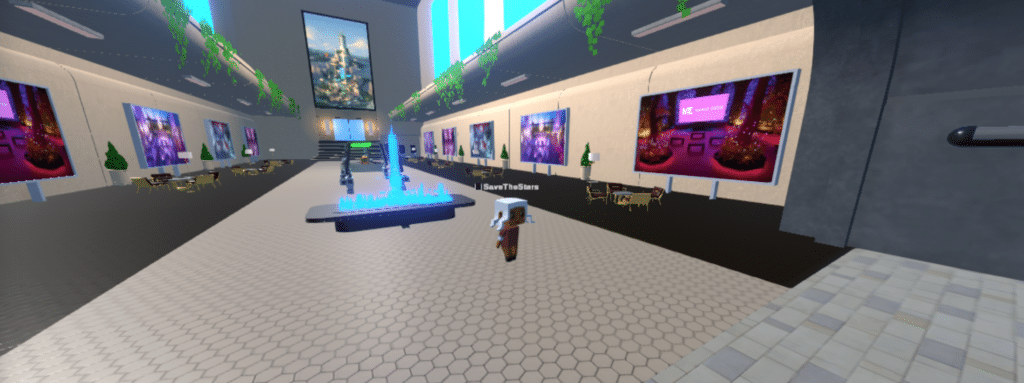 Loitering inside Building One in Downtown Image via Portals Preview
Loitering inside Building One in Downtown Image via Portals PreviewDisclaimer: I own SOL. I also bought a standard Citizen Card while doing research and am now contemplating getting a Genesis Citizen Card.





